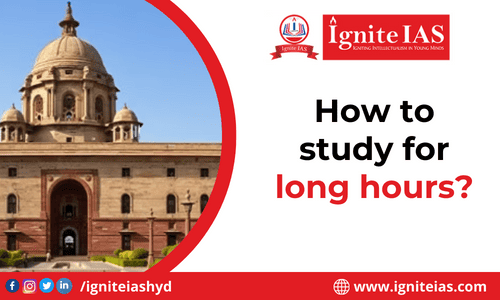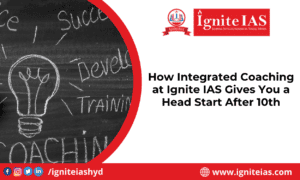Outline of the Article
1. Introduction to Studying for Long Hours
– Significance in IAS Preparation
2. Understanding the Challenges
– Mental Fatigue
– Lack of Focus
3. Creating an Effective Study Environment
– Ergonomics
– Minimizing Distractions
4. Planning Your Study Schedule
– Time Blocking
– Regular Breaks
5. Utilizing Productive Study Techniques
– Active Learning
– Mnemonics and Visualization
6. Incorporating Physical Activity
– Importance for Mental Alertness
– Short Exercise Breaks
7. Nourishing Your Body and Mind
– Balanced Diet
– Hydration
8. Embracing Perplexity in Learning
– Challenging Yourself
– Expanding Knowledge
9. Developing Burstiness in Study Sessions
– Intensity and Focus
– Techniques for Maintaining Burstiness
10. Balancing Specificity and Context
– Understanding Details
– Relating Information to the Exam
11. Conversational Style in Note-Taking
– Engaging with Material
– Creating Understandable Notes
12. Using the Active Voice in Self-Talk
– Positive Affirmations
– Motivational Internal Dialogue
13. Keeping It Simple Yet Detailed
– Clarity in Study Materials
– Avoiding Overcomplication
14. Analogies and Metaphors in Understanding Concepts
– Enhancing Memory Retention
– Simplifying Complex Topics
15. Conclusion: A Holistic Approach to Long Hours of Study
– Recap of Strategies
– Encouragement for IAS Aspirants
Introduction
Studying for long hours is a crucial aspect of IAS preparation, requiring a strategic approach to maintain focus and productivity. In this article, we’ll explore effective strategies for studying extensively while considering the unique challenges faced by IAS aspirants.
Understanding the Challenges
IAS preparation demands intense focus, and aspirants often encounter challenges such as mental fatigue and lack of concentration. Overcoming these hurdles is essential for successful and prolonged study sessions.
Creating an Effective Study Environment
Ensuring a conducive study environment is imperative. Pay attention to ergonomics, arrange a clutter-free workspace, and minimize distractions to enhance concentration and comfort.
Planning Your Study Schedule
Effective time management is key. Employ time blocking to allocate specific hours to different subjects, and incorporate regular breaks to prevent burnout and maintain a fresh mindset.
Utilizing Productive Study Techniques
Active learning methodologies, mnemonics, and visualization techniques can significantly enhance retention. Engage with the material actively to deepen understanding and improve recall during exams.
Incorporating Physical Activity
Physical activity plays a crucial role in maintaining mental alertness. Short exercise breaks can rejuvenate your mind, keeping you energized and focused during extended study periods.
Nourishing Your Body and Mind
A balanced diet and proper hydration are foundational to prolonged concentration. Ensure your body and mind are well-nourished to support optimal cognitive function.
Embracing Perplexity in Learning
Challenge yourself intellectually. Embracing perplexity in your studies by tackling complex problems enhances critical thinking and expands your knowledge base.
Developing Burstiness in Study Sessions
Burstiness, characterized by intense focus and productivity, is a valuable skill. Cultivate techniques to maintain burstiness, ensuring your study sessions are not only long but also highly effective.
Balancing Specificity and Context
Understanding the details of your subjects is crucial, but don’t lose sight of the broader context. Relate information to the IAS exam, striking a balance between depth and breadth.
Conversational Style in Note-Taking
Engage with your study material conversationally. Create notes in a way that facilitates understanding, making it easier to revisit and reinforce your learning.
Using the Active Voice in Self-Talk
Positive affirmations and motivational internal dialogue contribute to a constructive mindset. Use the active voice in your self-talk to foster confidence and perseverance.
Keeping It Simple Yet Detailed
Clarity is paramount. Ensure your study materials are detailed enough to cover the essentials but avoid overcomplicating information, making it more digestible.
Analogies and Metaphors in Understanding Concepts
Enhance memory retention by employing analogies and metaphors to simplify complex topics. These creative devices make abstract concepts more relatable and memorable.
Conclusion: A Holistic Approach to Long Hours of Study
In conclusion, studying for long hours requires a holistic approach. By creating an optimal environment, planning your schedule effectively, and incorporating various learning strategies, you can navigate the challenges of IAS preparation successfully. Remember, it’s not just about the quantity of study hours but the quality of your study approach.
FAQs on Studying for Long Hours (IAS Preparation)
1. How can I combat mental fatigue during long study sessions?
– Take regular breaks, practice mindfulness, and ensure a balanced diet to combat mental fatigue.
2. Is it beneficial to study one subject for an extended period, or should I switch between subjects?
– A mix of both is recommended. Switching between subjects prevents monotony, but focusing on one subject can deepen understanding.
3. How long should breaks be during extended study sessions?
– Breaks of 5-10 minutes every hour are ideal to prevent burnout and maintain concentration.
4. Are there specific foods that enhance cognitive function during study sessions?
– Foods rich in omega-3 fatty acids, antioxidants, and complex carbohydrates support cognitive function. Include nuts, fruits, and whole grains in your diet.
5. How can I stay motivated during long hours of study?
– Set realistic goals, celebrate small victories, and maintain a positive mindset. Break down your study sessions into manageable chunks for sustained motivation.




